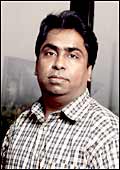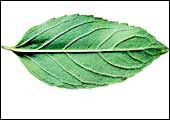|
Who: Rahul Dravid; anointed India's cricket captain recently
in the midst of major controversies (all unrelated to him)
What: He is suddenly considered hot property in the brand
endorsement market. The Sahara Group signed him on recently. "They
want to tap his brand essence," says Kartikeya Rao, Vice
President, 21st Century Media, the agency that handles his account
Price tag: Around Rs 2 crore per annum per deal. That
makes him the second highest paid cricketer after Sachin Tendulkar
Why: Because marketers think that like Tendulkar, his
brand image remains unspoilt. Says Debashish Sarkar, Director
(Marketing), Max New York Life: "Rahul stands for honour,
dependability, and trust and, hence, is a great endorser for a
brand like ours."
-Archna Shukla
Mint Causes Heartburn
What: An aromatic plant called mentha arvensis is causing
massive heartburn for US mint farmers.
Why: The Central Institute of Medicinal and Aromatic
Plants (CIMAP) has developed four varieties of high yielding,
early maturity mint and, in partnership with the Small Industries
Development Bank of India (SIDBI), equipped Indian farmers with
distillation units to convert their crop into oil. Result: less
wastage and better prices (of Rs 400 per litre). "It beats
the economics of producing menthol anywhere in the world,"
says S.P.S. Khanuja, Director of CIMAP.
What is it used for: Menthol is used in pharmaceuticals,
cosmetics, confectionary, perfumes and toothpastes. India exports
close to 11,000 tonnes of mint every year.
So what: US farmers can't compete with Indian prices. "Some
growers have gone broke; others like me are nearly broke,"
says Steve Street, a farmer in Rainbow Gardens in Montana, US.
-Amanpreet Singh with Ryan Wenzel
Consummate Dealmaker
 |
| Sivasankaran:
From vital to viable |
NRI businessman C. Sivasankaran
(44) has a very clear business philosophy: "The reason I
sell a business is not just to make money, but to get a better
return on management." He's done both with the sale of Chennai
mobile operator Aircel for Rs 4,860 crore; that's 16 times earnings,
against the 10 times that he had wanted. "I turn the vital
needs of society into viable business propositions," says
the man who acquired Sterling Computers in 1983, and made a splash
in the market with the computer's attractive price tag. Soon,
others followed suit. Siva felt the business would not be viable
in the long run and closed it down. He then acquired cellular
licences for Delhi and three adjoining states and sold these in
the mid-90s. In return, he got some cash and Tamilnad Mercantile
Bank shares worth Rs 65 crore from the Essar Group, one of the
buyers, which he now proposes to sell to members of the Nadar
community for Rs 211 crore. There have been other high- and low-profile
deals-in March 2004, he sold his Dishnet DSL internet business
to VSNL for Rs 270 crore; and the Barista buyout in December 2004
for an estimated Rs 70 crore. Two decades of buying and selling
companies have given him a personal net worth of Rs 4,500 crore.
So, don't be surprised if you see his name in the next list of
Forbes billionaires.
-Nitya Varadarajan
P-WATCH
A bird's eye view of what's hot and what's
not on the government's policy radar.
ON
THE CHOPPING BLOCK
Direct subsidies to consumers
on food, kerosene, cooking gas and fertilisers are at Rs 42,000
crore now. This is about 8 per cent of total revenues. The
government plans to: |
|
» Reduce
FCI stock holdings in north India
» Cut
fertiliser subsidy by rationalising retention price for
urea manufacturers
» Limit
tax subsidies to SSIs with turnover above a yet-to-be decided
figure
» Reduce
cheap loans and loan guarantees to public sector units
|
SHRINKING THE SUBSIDY BILL
The government has taken its first politically sensitive step:
it has decided to slash the monthly foodgrain quota under the
public distribution system (PDS) and raise prices for households
above the poverty line (or APLs). The monthly grain quota of families
below the poverty line (or BPLs) will now be 30 kg per month and
that of APLs 20 kg a month, against 35 kg for both categories
earlier. This will result in a saving of Rs 4,524 crore. Official
sources say more such steps to cut the total subsidy bill of Rs
1,10,000 crore, or 20 per cent of total revenues, are on the anvil
(see On The Chopping Block).
-Ashish Gupta
PLAN TO PROVIDE FERTILISER SUBSIDIES DIRECTLY
TO FARMERS
This one could go down as the policy that didn't work. The Y.K.
Alagh Committee on Fertiliser Pricing has recommended that the
fertiliser subsidy, which currently stands at Rs 16,253.90 crore
per annum, be given directly to farmers. The New Urea Policy says
this scheme should be tried out as an experiment in three to five
districts on an experimental basis by the Ministry of Fertilisers.
Currently, fertiliser companies are given the subsidy on the basis
of their sales. However, the ministry is not convinced about the
new scheme. "The problem is one of implementation," say officials.
After all, it's going to be well nigh impossible to identify the
millions of farmers who will be eligible for the subsidy and then
distribute this huge corpus among them.
-Ashish Gupta
TWO-YEAR EXPENDITURE CYCLE
The government is likely to account for its expenditure over
a two-year cycle. "The people of the country are concerned with
outcomes," Finance Minister P. Chidambaram had said in his last
Budget speech. That led to a novel initiative, the Outcome Budget,
in the middle of last year. The same logic is now being taken
forward, reportedly at the express behest of UPA chairperson Sonia
Gandhi. The government realises that it will be difficult to spend
the planned Rs 1.43 lakh crore during this fiscal. The solution:
a two-year spending period; this will provide ample time for implementating
the investment programme and remove the need for fresh, and time
consuming, approvals at the end of each fiscal.
-Kumarkaushalam
 |
| Minister Yadav: Containable? |
EASIER FDI NORMS
On January 4, a group of Ministers headed by Agriculture Minister
Sharad Pawar prepared a new policy package to allow 100 per cent
FDI in captive coal-mining and the exploration of minerals such
as gemstones. It also recommended approval through the automatic
route for FDI in power, cement and steel projects and in laying
of gas pipelines. The proposal will be placed before the Cabinet
in February.
-Ashish Gupta
PRIVATE FREIGHT TRAINS
Railway minister Lalu Prasad Yadav has relinquished his ministry's
monopoly over the container transportation business controlled
by the Container Corporation of India (Concor). Over two dozen
players (including Reliance Industries and Adani Ports) have expressed
interest in entering the sector. All companies, including Concor,
will be required to pay a one-time registration fee of Rs 50 crore
(valid for 30 years) for all routes and Rs 10 crore for if they
wish to operate only on a select route.
-Kumarkaushalam
|







